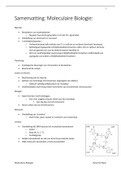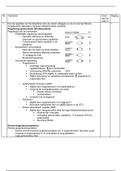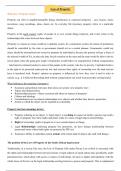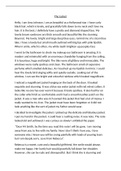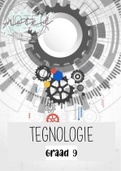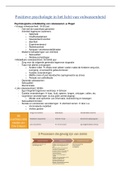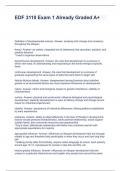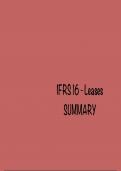Renkie Nyeleti Mkhize
Sepedi FAL Poetry Notes
Author: Renkie Nyeleti Mkhize
Organisation: TEAM Extra Classes
Contents
Basic Terminology ................................................................................................................................. 2
Sepobego sa ka ntle sa sereto ............................................................................................................. 3
Sepobego sa ka gare sa sereto ........................................................................................................... 3
Sonete (Sonnet)..................................................................................................................................... 3
Poeletšo .................................................................................................................................................. 3
Morumokwano ....................................................................................................................................... 4
Tlogelo .................................................................................................................................................... 4
Kgopolotšweledi/entšampemente ......................................................................................................... 5
Potšišoretoriki ......................................................................................................................................... 5
Leswao le ( - ) .......................................................................................................................................... 5
Sešura...................................................................................................................................................... 5
1|Page
, Renkie Nyeleti Mkhize
Basic Terminology
1. Ditematheto – is what we call a stanza’
2. Methalotheto – refers to lines. For example, Tematheto ye e na le methalotheto e
me nne (This stanza has or is composed of four lines) DO NOT CONFUSE
‘MOTHALOTHETO’ TO A SENTENCE.
3. Kgopolotšweledi/entšampemente – is enjambment, this is when a thought carries
over to the next line.
4. Maikutlo – feelings
5. Potšišorithoriki – refers to a rhetorical question.
6. Mothofatšo – refers to personification
7. Tshwantšhanyo/papišo – refers to a metaphor
8. Tshwantšhišo – refers to a simile
9. Tumelokganetši – refers to an oxymoron
10. Sekai – Taba ga e bolelwe phatlalatša. Go dirišwa selo se sengwe go emela se
sengwe.
11. Moya wo o fokwago – refers to the atmosphere that the poet brings about with
the poem.
12. Tlemanyithalo – when the last word of the line repeats itself in the next line as the
first word
Example: The sky is so wide yet vivid, (Line 1)
Vivid as it seems, it makes like beautiful. (Line 2)
13. Pheletšo – refers to an exaggeration or hyperbole.
14. Pebofatšo – Euphemsim ,which means to refer to things on a lighter note.
For example: Manto o nyaka go kaka.
Manto o sa nyaka go šomiša ntlwana.
15. Morumokwano – refers to a poems rhyming scheme.
16. Maekiši/Onomathopia – refers to onomatopoeia
17. Papadišantšu – this refers to when the poet plays around with words the purpose
is to emphasize a particular thought (Go gatelela kgopolo).
18. Sonete – refers to a Sonnet
19. Sešura – it is a natural pause ( Ke khutšo ya tlhago gomme sona se kgaogantšha
mothalotheto gore o be le dikarolometara tše pedi ka tirišo ya leswao le ( / ).
20. Poeletšo – refers to repetition in a poem
21. Ditumanoši – refers to vowels (a, e, i, o, u )
22. Ditumammogo – refer to consonants (the rest of the alphabet with a, e, i, o, u)
23. Tshwantšokgopolo – E lebane le ka fao sereti se bontšhago mmadi moko wa
dikgopolo tšeo a ratago gore di tšwelele ka leihlo la moya. (in some sense it
basically outlines how symbolism in the poem was used to make the poem or the
message in the poem more effective.)
24. Tlogelo – omission for example Leihlo can be written as ‘eihlo (nepo ya gore rena
bjalo ka babadi re tšee karolo.)
2|Page
Sepedi FAL Poetry Notes
Author: Renkie Nyeleti Mkhize
Organisation: TEAM Extra Classes
Contents
Basic Terminology ................................................................................................................................. 2
Sepobego sa ka ntle sa sereto ............................................................................................................. 3
Sepobego sa ka gare sa sereto ........................................................................................................... 3
Sonete (Sonnet)..................................................................................................................................... 3
Poeletšo .................................................................................................................................................. 3
Morumokwano ....................................................................................................................................... 4
Tlogelo .................................................................................................................................................... 4
Kgopolotšweledi/entšampemente ......................................................................................................... 5
Potšišoretoriki ......................................................................................................................................... 5
Leswao le ( - ) .......................................................................................................................................... 5
Sešura...................................................................................................................................................... 5
1|Page
, Renkie Nyeleti Mkhize
Basic Terminology
1. Ditematheto – is what we call a stanza’
2. Methalotheto – refers to lines. For example, Tematheto ye e na le methalotheto e
me nne (This stanza has or is composed of four lines) DO NOT CONFUSE
‘MOTHALOTHETO’ TO A SENTENCE.
3. Kgopolotšweledi/entšampemente – is enjambment, this is when a thought carries
over to the next line.
4. Maikutlo – feelings
5. Potšišorithoriki – refers to a rhetorical question.
6. Mothofatšo – refers to personification
7. Tshwantšhanyo/papišo – refers to a metaphor
8. Tshwantšhišo – refers to a simile
9. Tumelokganetši – refers to an oxymoron
10. Sekai – Taba ga e bolelwe phatlalatša. Go dirišwa selo se sengwe go emela se
sengwe.
11. Moya wo o fokwago – refers to the atmosphere that the poet brings about with
the poem.
12. Tlemanyithalo – when the last word of the line repeats itself in the next line as the
first word
Example: The sky is so wide yet vivid, (Line 1)
Vivid as it seems, it makes like beautiful. (Line 2)
13. Pheletšo – refers to an exaggeration or hyperbole.
14. Pebofatšo – Euphemsim ,which means to refer to things on a lighter note.
For example: Manto o nyaka go kaka.
Manto o sa nyaka go šomiša ntlwana.
15. Morumokwano – refers to a poems rhyming scheme.
16. Maekiši/Onomathopia – refers to onomatopoeia
17. Papadišantšu – this refers to when the poet plays around with words the purpose
is to emphasize a particular thought (Go gatelela kgopolo).
18. Sonete – refers to a Sonnet
19. Sešura – it is a natural pause ( Ke khutšo ya tlhago gomme sona se kgaogantšha
mothalotheto gore o be le dikarolometara tše pedi ka tirišo ya leswao le ( / ).
20. Poeletšo – refers to repetition in a poem
21. Ditumanoši – refers to vowels (a, e, i, o, u )
22. Ditumammogo – refer to consonants (the rest of the alphabet with a, e, i, o, u)
23. Tshwantšokgopolo – E lebane le ka fao sereti se bontšhago mmadi moko wa
dikgopolo tšeo a ratago gore di tšwelele ka leihlo la moya. (in some sense it
basically outlines how symbolism in the poem was used to make the poem or the
message in the poem more effective.)
24. Tlogelo – omission for example Leihlo can be written as ‘eihlo (nepo ya gore rena
bjalo ka babadi re tšee karolo.)
2|Page

